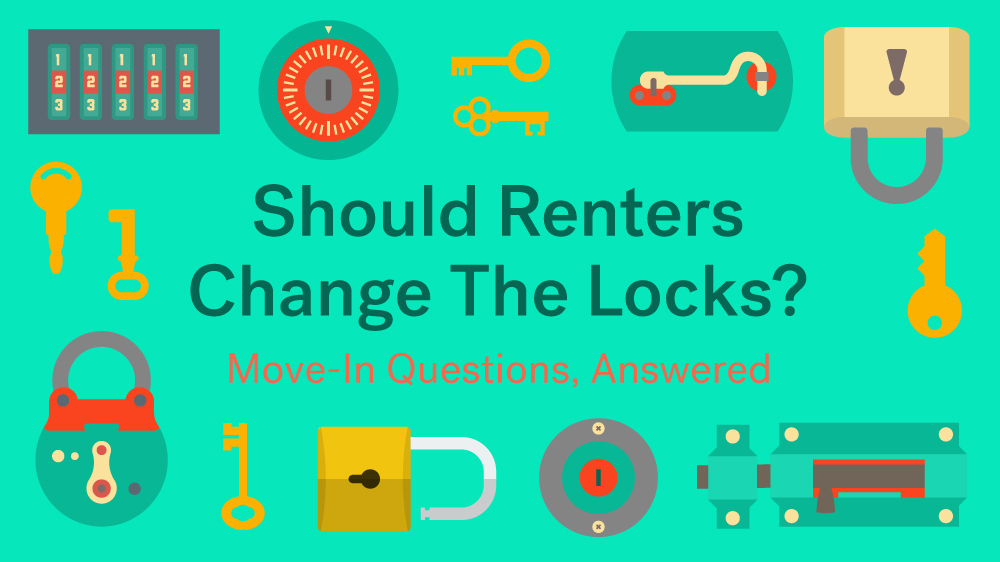You’ve found your ideal apartment, signed the lease, and exchanged the keys. You’ve already sorted out the major issues, from pets to parking, but now some questions you hadn’t previously considered are coming up: Can you change the locks on your apartment? Can you sublet while on vacation? Don’t let these uncertainties stress you out—save that energy for decorating and giving your new pad a personal touch.
Know What to Ask Before Moving In.
1. Should I change the locks?
It’s normal to be nervous at the thought of a previous renter having a copy of your keys. But as a renter, are you allowed to change the locks? You should ask the property manager if this is allowed. If not permitted, you must decide if you’re comfortably safe in the building. If you have concerns, it may be a sign that another apartment might be a better choice for you. If changing the locks is permitted in your lease, check with your landlord to find out their preferred process. You may need to submit an official request to management, or you may be able to arrange the service yourself and provide your landlord with a key. Either way, your landlord is always entitled to a key to your apartment.
2. How will I know how to handle my trash and other basic logistics?
Before you sign on the dotted line there are many details about day-to-day living you need to know. “A good lease should answer most of your questions, but leasing agents and managers are more than happy to provide additional information,” says Robert Pinnegar, president and CEO of the National Apartment Association.
For example, you want to be sure to ask about:
- Trash: Where it goes, rules for packing it, how often the sanitation department picks it up.
- Laundry: What the time rules are for operating the building’s washer and drier.
- Parking: Are spaces open or assigned to each apartment.
- Nails and hooks: Are you allowed to hang pictures and personal items on the walls, and if yes, are you required to fill them before moving out.
- Repairs: Whom should you call if the toilet clogs.
- Replacements: Are you allowed to change light fixtures, bathroom faucet, doorknobs, or the toilet seat. If yes, are you required to replace with the originals when you move out.
3. Can I sublet my apartment on Airbnb?
Your lease probably contains a clause expressly stating that tenants cannot assign or sublet their apartment without written consent. “No landlord today would likely allow an Airbnb rental,” says Rande Joiner, an attorney in Washington. “It would be a violation of your lease if you were to do so.”
“You should also look into local regulations as some cities have laws governing Airbnb rentals,” adds Pinnegar.
4. Do I have rights as a tenant?
“Of course, you do,” says Brian Sullivan, a spokesman for the U.S. Department of Housing and Urban Development. “There’s a truism that all housing is local, and so it is with tenant rights” he says. “While the Fair Housing Act prohibits housing discrimination regardless where you live, some tenant protections are more robust in some cities than others.” While the HUD website includes many of these state and local requirements, Sullivan suggests renters should check their local tenant help center.
5. How can I connect with my neighbors?
An apartment building offers a great opportunity for friendships and developing a network of helpful home resources. Ask the property manager if there’s a Listserv or Facebook page for the building. Check out notices in the elevator and the bulletin boards in the community rooms or basement for notices about holiday activities and special event gatherings. And, of course, say hi to people in the elevator, hallways, and lobby as you stroll by.
6. How can I cultivate a good relationship with my landlord?
It goes without saying that it’s in your best interest to stay on your landlord’s good side. In addition to being generally pleasant, take the time to say thank you for things that are going well. There will be times when you need things from your landlord, whether its a repair or even leniency on your rent by a day or two. If you’ve built a positive relationship with them, those awkward scenarios will become a lot easier on both of you.
And, of course, be respectful to your rental as well.
“Treat the apartment as if it’s your own,” says Joiner. “If there’s something even minor like a small leak, tell the landlord about it expeditiously so it doesn’t become an emergency situation. Owners are usually glad to hear about little problems before they become big ones.”
7. How secure is a full refund of my security deposit?
Your lease will include info on your security deposit, how it’s collected when you move in, and the requirements you must meet when moving out to get back the full amount, says Pinnegar. “Before you bring in your own things on move-in day, check the apartment for pre-existing damage. Look for scratches on the floor, wall, and appliances. If you see any damage, take pictures to show the property manager, and ask that a list of those damages be put in writing,” he says. “Otherwise you could be held responsible for them and charged at the time you move out by a deduction in your security deposit.”
What are your burning rental questions? Let us know in the comments below!
Originally published March 24, 2017. Updated November 2, 2017.


